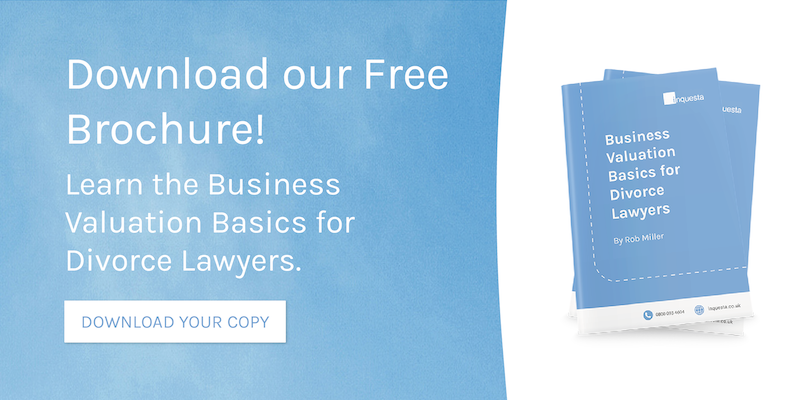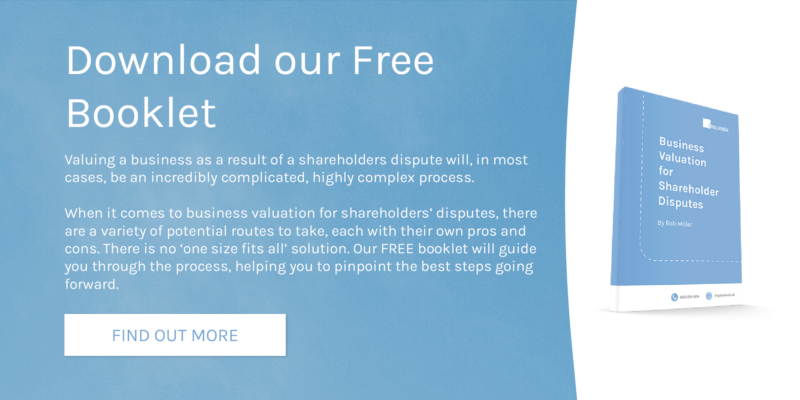In business, it’s not uncommon for relationships to become frayed. As a shareholder or owner of a company, it’s not unheard of for you to have to contend with shareholders’ disputes at some point — and how prepared you are can have a huge impact on both the short and long-term future of your firm.
With the global financial market and economy struggling as much as virtually any other time in modern history, strained relationships between business partners and shareholders can be expected. When things are going well, it’s all too easy for one party not totally pulling their weight to be overlooked. However, when the going gets tougher, these issues can come to the fore — disputes are sure to follow.
One of the key tools in the arsenal of any company owner entangled in a shareholder dispute should be business valuation. It can turn the tide of a dispute, efficiently and effectively put an end to the issues.
The following blog will break down what business valuation means as well as some of the common methods of valuation, types of shareholders’ disputes that could be helped with company valuation, and discuss exactly how business valuation helps.
What Does Business Valuation Mean?
Business valuation is the process of determining the market value of a business. While business valuation may differ from company to company, the final goal should always remain the same — to determine an approximate yet accurate value taking into account factors including expenses, assets, strategy, and more.
The purpose of a business valuation is typically to give either an owner or a potential investor an objective estimate and an idea of what the company they own/are seeking to own is worth.
Most Common Business Valuation Methods in the UK
The most common business valuation methods in the UK look at a company’s income, net assets, or dividend yield. There are other prevalent techniques, but these three are what you can likely expect as they are also the most preferred in the United Kingdom amongst business owners, shareholders, and forensic accountants alike.
The three most common methods of business valuation are:
- Income Approach: Assessing a businesses value based on its income is done with the mindset that owners or prospective buyers will primarily be looking at the future return on investment it may achieve from a business. As a result this amount should be seen as the main indicator of value.
- Net Asset Method: The Net Asset considers the value of the assets and liabilities of a business. This approach is useful in an asset heavy business with limited trade. .
- Dividend Yield Basis: To calculate the dividend yield basis of your business you must divide the maintainable dividend by the required rate of return. This method is particularly useful in cases of minority Shareholders’ disputes.
Types of Shareholder Disputes Where Business Valuation Can Help
From removing a partner or being removed from your business, unhappiness over the value of your dividend, accusations of withholding financial information from within, or a shareholder or partner seeking to exit the company, there are all manner of different types of shareholders’ disputes, and business valuation can help resolve them.
The most common types of shareholders’ disputes include:
Partner Removed From Business
Any shareholder agreement should include clear precedent of when and how a shareholder can be removed. However, this is not always the case, which leads to a common cause for dispute.
If attempts to remove a partner from the business have not led to an amicable conclusion for both parties, it is not unheard of for the ‘aggrieved’ party to attempt to demand a premium in return for their shares in order to hold the remaining partners/shareholders to ransom. This is often done to attempt to skew the balance of power in a situation in their favour.
Conducting a thorough and detailed business valuation using any of the number of common methods listed above or beyond should lead to a fair compromise being made and a price being agreed.
Unhappiness with Value of Dividend
It is common for shareholders to not technically even be employed or involved in the day-to-day running and management of the business they own shares in. In these situations, the only interaction the shareholder will actually have with the business is to collect the income by way of dividend on their investment. However, if their expectations for the amount they will receive do not match the reality of what they achieve, a dispute is sure to follow.
A business valuation can be utilised to come up with a more exact and data-driven dividend amount. This evidence with regards to the actual and fair value of the dividend should, in most cases, put an end to any unhappiness.
Accusations of Withholding Financial Information
When conducting business, it is unfortunate that honesty is not always guaranteed. One of the most serious breaches of trust in business can be accusations of a company director withholding financial information from a shareholder.

This practice can be done to benefit a director in multiple ways:
- To trick a shareholder into believing that their investment is performing well, when in fact the business is struggling — perhaps to allow for additional breathing room.
- Misleading shareholders that the company is underperforming and struggling in order to get away with falsely limiting dividend payouts.
- It is possible that a director may choose to withhold payments from a genuine supplier, and not tell shareholders. This situation could, in time, lead to the company being wound up.
Shareholder or Partner Wanting to Exit the Firm
As covered above, a business opting to remove a shareholder can cause significant issues for all parties. However, if not handled properly, a shareholder or partner seeking to exit a business can also cause disagreement.
The primary cause for issue usually will boil down to the outgoing shareholder/partner seeking to get their perceived value of their shares, which can often be vastly different from reality. Due to the value of a business being in a constant state of flux, this amount cannot be laid out in any shareholder agreement as is instead left to all parties to work out should and when they need to.
How Business Valuation Helps with Shareholder Dispute Resolution
In the event of a shareholder dispute, particularly the highly contentious disputes, it is likely that one party will either wish to exit, or for their investment to be met with significant compensation. In this case, the true value of your business will play a vital part in the resolution to the dispute.
Finding a valuation figure that both parties will agree on can often be difficult — as both sides of the dispute will be seeking to skew the valuation in their favour.
Regardless of how a shareholder dispute is ultimately settled, an up-to-date business valuation is likely necessary. In some cases, a shareholder agreement will include a right of appraisal in the event for just such a dispute.
When attempting to utilise a business valuation to assist in the resolution of a shareholder dispute, it is always worth considering consulting with an independent expert such as a forensic accountant. An expert will be able to evaluate your company’s situation and be unbiased when conducting the valuation. This verifiably fair assessment can go a huge way towards bringing to an end what has likely been a difficult period of unrest for the business.
Why Work with Inquesta When Valuing a Business
Commercial disputes come in all shapes and sizes, and can be incredibly complicated and difficult to resolve. Inquesta has decades of experience in forensic accounting, making us perfectly placed to help, no matter the issue.
Our expert team will carry out an in-depth review of your company and provide an accurate valuation, taking into account a variety of different areas of your business. The vast pools of expertise and knowledge within our specialist team means that you can be sure that no matter what, you are in the best possible hands.
For additional information on conducting a business valuation for shareholders’ disputes have a look at our eBook, or get in touch today with a member of our team to find out more about how Inquesta can assist you or to book a free no obligation consultation.



